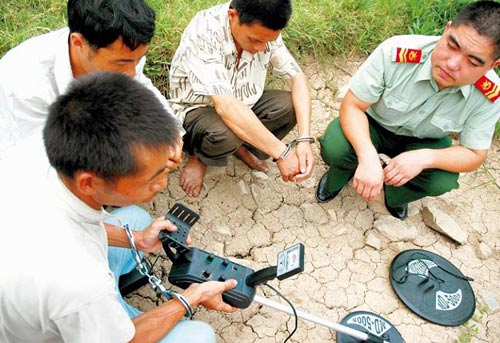A grave robber's world
|
One of the three grave robbers who were caught by the police in southeast China's Zhejiang Province in 2007 is showing how to use a remote sensor. |
Slim and short, a young man squatted behind a pile of porcelain vases and wooed his customers. His grimy fingernails, soiled skin and the yellowish freckles on his wrists provided a clue to his vocation – grave robber.
Dong Mu (alias) is one of hundreds of antique dealers who convene at Baoguo Temple in Beijing each Thursday to sell their merchandise. Without any hint of shame, but rather as a selling point, Dong boasts that he himself dug out the items from graves.
Grave robbers like Dong wander the countryside and cities stealing from the dead, and hoping to make a fortune. Experts estimate 100,000 grave robbers could be roaming the country.
The craft
Li Jianmin, a researcher from the Institute of Archaeology, Chinese Academy of Social Sciences, expressed his regret on the rampant trade, "Only the provinces with abundant cultural relics were targeted by grave robbers in the past, but now, wherever there is a tomb, there is a grave robber."
As the business of grave robbing has grown, so has the expertise of the thieves.
"It's worth noting that many grave robbers have mastered quite professional knowledge on archeology," Li said, adding that the government should prosecute grave robbers more harshly.
The traditional craft of grave robbing can be generalized as "wàng (observe), wén (smell & listen), wèn (ask), and qiè (touch)" – the same ways of traditional Chinese medicine.
Wàng – Most of the ancient tombs were located in "blessed land," where there are hills and waters, and the way crops growing above them is usually not as good as the ones in other places.
Wén – Eercury and vermilion were used for antisepsis in the tombs of the Qin Dynasty and Han Dynasty, while green paste mud was adopted after the Song Dynasty. Experienced grave robbers are sensitive to the smell. "Wén" also means "listen." When there is a thunder, the sound from a large-sized tomb is rather unique.
Wèn – In order to get information, grave robbers question local elders about an area's history.
Qiè – It means three things to grave robbers: find the precise location and enter the tomb; open the coffin and collect the treasures; identify their value.
Beside traditional tricks, grave robbers have also adopted high-tech means such as remote sensing and aerial survey.
The industrialization
Having a thousand-year history, grave robbing is now "industrialized" into a chain of excavation, smuggling, storage, and selling.
It's often a team activity with a core leader who masterminds the operation. Another individual is responsible for obtaining the equipment needed for a specific grave excavation. Then there are "technical workers," who locate the tomb's precise position. Finally, there are the laborers, mostly migrant workers, who dig and get dirty.
 0
0 








Go to Forum >>0 Comments